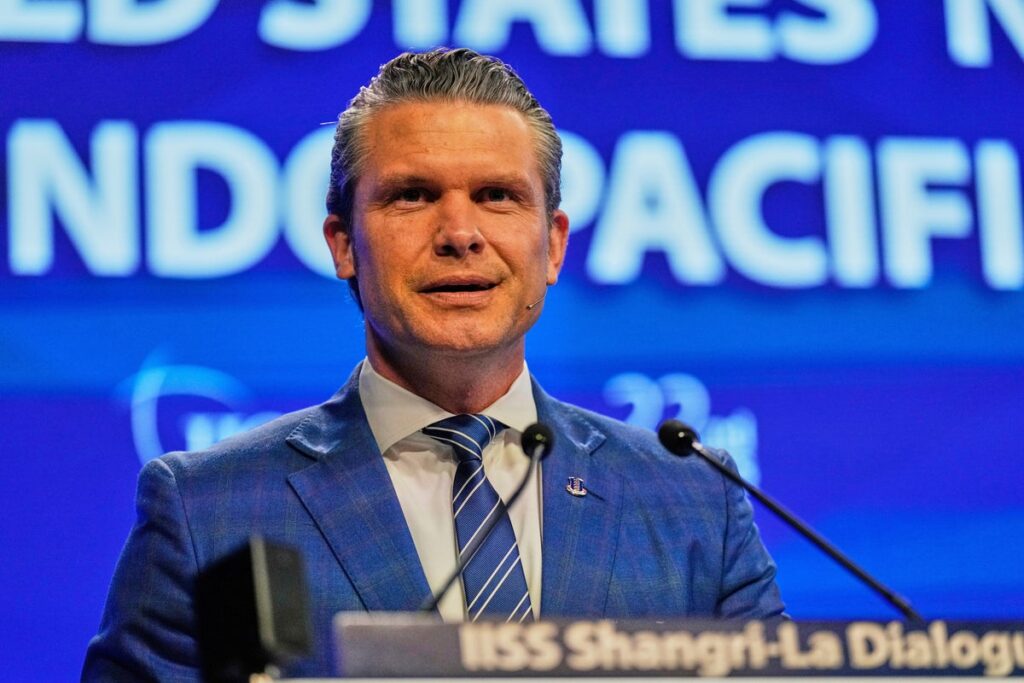Beijing Responds to U.S. Criticism Amid Rising Tensions
On Sunday, China issued a strong rebuke against U.S. Defense Secretary Pete Hegseth, who had characterized China as a threat during the recent Shangri-La Dialogue, a prominent international security conference. Beijing accused Hegseth of promoting a Cold War mentality and fueling hostility between the two superpowers at a time when diplomatic relations are already strained.
Accusations of Provocation and Cold War Rhetoric
The Chinese Ministry of Foreign Affairs condemned Hegseth’s remarks, claiming he had launched unfounded and defamatory attacks on Beijing. The ministry emphasized that his comments disregarded the global call for peaceful coexistence and instead echoed Cold War-era rhetoric, reminiscent of the rivalry between the United States and the Soviet Union after World War II. They argued that such language only exacerbates tensions and undermines efforts toward regional stability.
Concerns Over U.S. Strategies in Asia-Pacific
Beijing further accused Washington of destabilizing the Asia-Pacific region by undermining peace and balance. The statement highlighted that no nation should be labeled a hegemonic power, asserting that U.S. actions threaten regional security. This comes amid ongoing concerns about U.S. military presence and strategic maneuvers in the area, especially regarding China’s stance on Taiwan.
U.S. Military Posturing and Regional Tensions
During a speech in Singapore on Saturday, Hegseth announced that the United States plans to strengthen its military presence abroad to counter what the Pentagon perceives as emerging threats from China. He pointed to China’s aggressive posture toward Taiwan and claimed that the Chinese military is preparing for potential conflict, describing the situation as a serious and imminent threat.
China’s Perspective on Taiwan and Regional Security
China maintains that Taiwan is an internal matter and warned the U.S. against “playing with fire” over the issue. Beijing also accused Washington of deploying offensive weaponry in the South China Sea, which it claims is fueling regional tensions and turning the area into a “powder keg.” The Chinese government emphasized that these actions threaten regional peace and stability.
Diplomatic Reactions and Public Statements
In a social media statement on Saturday, China’s Embassy in Singapore described Hegseth’s speech as “provocative and instigative.” The embassy reiterated China’s stance that the South China Sea islands are inherently Chinese territory and criticized what it called illegal incursions by the Philippines into waters near disputed reefs. It also accused external powers of exacerbating tensions through the deployment of offensive weapons and military exercises, which it claims threaten regional peace.
Trade and Diplomatic Developments
Last month, the U.S. and China reached a temporary trade truce, reducing tariffs from 145% to 30% for 90 days, providing a window for negotiations. China also cut its tariffs on U.S. goods from 125% to 10%. However, the future of this agreement remains uncertain, as recent statements from President Trump suggest a potential hardening stance, with indications that the U.S. may no longer be “nice” in trade negotiations and accusing China of breaching previous agreements.
Escalating Tensions and Regional Dynamics
Recent developments, including the U.S. announcement to revoke visas for Chinese students and ongoing disputes in the South China Sea, have heightened tensions. Philippine Defense Secretary Gilberto Teodoro dismissed claims that the U.S. is the primary problem, citing ongoing clashes with China over territorial claims. China responded by reaffirming its sovereignty over the disputed islands and criticizing external interference, particularly pointing to the Philippines’ activities in the region.
Linking Regional Conflicts and Global Politics
Amidst these tensions, China’s embassy in Singapore also addressed comments linking the Taiwan issue with the Ukraine conflict. Following French President Emmanuel Macron’s remarks about double standards in international responses to potential conflicts, China’s diplomatic mission warned against applying double standards, emphasizing that such an approach only perpetuates global inconsistencies.
Leadership and Diplomatic Engagements
This year, China’s participation in the Shangri-La Dialogue was more subdued, with a delegation led by Major General Hu Gangfeng, vice president of the People’s Liberation Army National Defense University, instead of the usual high-level officials. This shift reflects China’s cautious approach amid rising tensions and ongoing diplomatic disputes.

